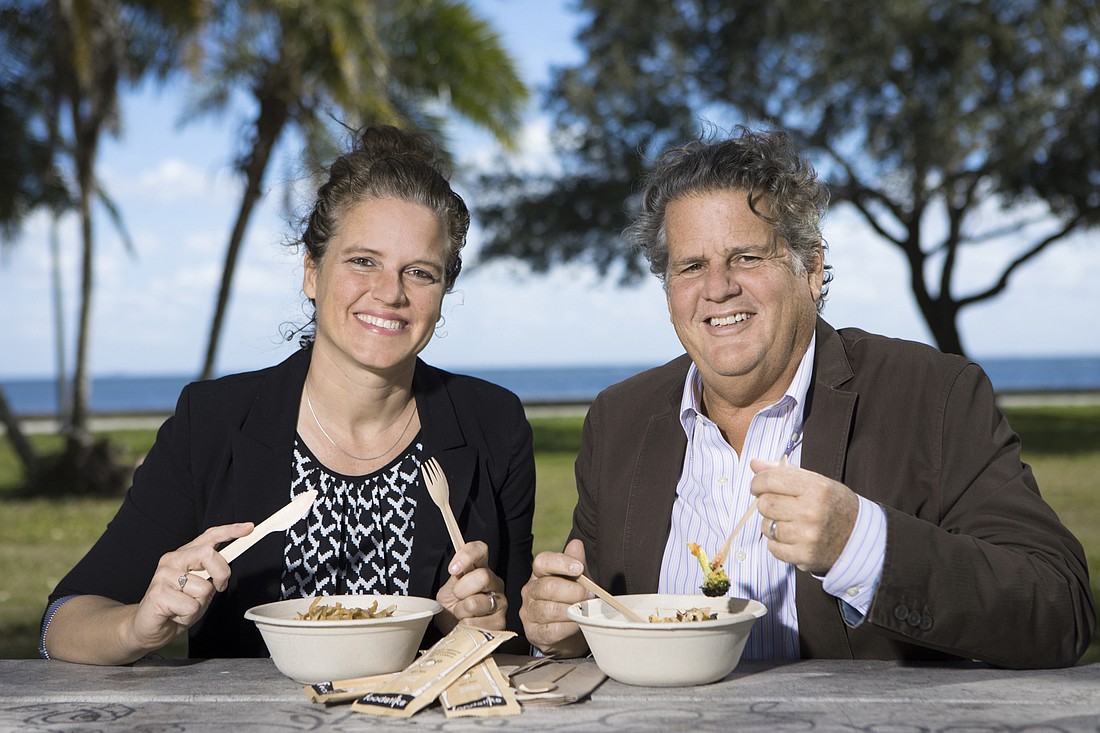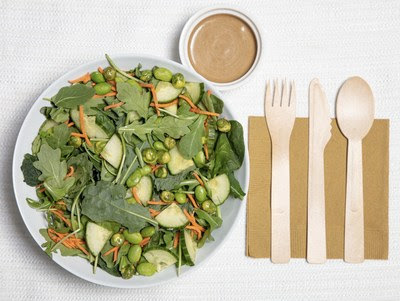- February 4, 2026
-
-
Loading

Loading

With plastic shopping bags and straws becoming frowned upon in many communities across the country, St. Petersburg entrepreneurs Jim and Ina Henderson expect plastic utensils to join them as persona non grata products, so they’ve launched Foodstiks, a company that specializes in disposable cutlery made of 100% birch wood.
Major retailers also expect the trend to catch on, especially now that plastic cutlery has been banned in India, with Canada considering similar action. Target, for one, has struck a deal with Foodstiks that will see the company’s 24-piece utensil sets sold in select U.S. stores — around 300, mainly on the east and west coasts — and via Target.com.
The Minneapolis-based retailer “surprised us with their initial order,” Ina Henderson says. “They were going to order much less, but went with triple what they had projected.”
But for Jim, 52, and Ina, 40, the shift from high-end, custom woodwork to mass-produced wooden cutlery has presented some learning curves. They took a huge risk when they sold their previous business, Cuttoffs — which designs and makes walls and floors for commercial and residential projects — to focus solely on Foodstiks. (You can see a great example of their Cutoffs work at Green Bench Brewing Co. in St. Pete.)
“The sales aspect is completely new,” Ina says. Jim adds, “We’re still finding our way around how to get sales. If you can’t get a meeting, you can’t show your product.”
One solution? Go to where the customers are: Jim and Ina have focused their sales and marketing efforts in California, where Foodstiks has a warehouse, in Ventura, and where local governments tend to be more progressive when it comes to banning single-use plastic products.
“We’re still finding our way around how to get sales. If you can’t get a meeting, you can’t show your product.” Jim Henderson, co-owner of Foodstiks
And, while they wait for the retail market to further materialize, they’ve found success as a wholesale supplier to clients in the foodservice sector.
“That’s our big market — foodservice,” Jim says. “We sell to the University of California San Diego and UC La Jolla; these universities, they go through so much cutlery, but now they don’t want any plastics — only natural materials.”
Locally, Foodstiks has had some success with Rollin’ Oats, a specialty grocery store in St. Pete, and Awful Waffle in Tampa. But a similar mindset shift has yet to fully materialize throughout the United States.
“It’s a slow process,” Ina says. “Single-use plastic is extremely convenient. It’s changed how we do everything. People are so used to using it.”
Price is another factor, the Hendersons have found. A Foodstik utensil costs about four cents to manufacture, whereas its plastic counterpart can be made for as little as one cent. That difference, of course, gets passed along to the customer. That’s why, for example, a 24-pack of Foodstiks cutlery retails at Target for $3.19, whereas a 72-pack of its plastic equivalent costs just $1 more.
“That’s our hurdle,” Jim says.
The supply-chain crisis hasn’t helped, either. Foodstiks cutlery is manufactured in China, and the cost to ship a container to Los Angeles has surged from $3,500 to $10,000. That’s why one of the Hendersons’ long-term goals is to manufacture domestically.
“There are plenty of birch forests here in the U.S.,” Jim says, “especially in Michigan, Wisconsin and the Northeast, where woodworking industries have slowed down. There’s plenty of birch there.”

But while wood is generally viewed as a more environmentally friendly material than plastic, Jim says, “people have this impression, sometimes, that cutting down trees is bad, but forestation is what we are talking about. These trees are grown to make products — birch plywood, for example. There are strains of birch that, in 15 years, can be made into products.”
Despite logistical headaches and other speed bumps, Foodstiks grew its revenue (the Hendersons decline to disclose specific numbers) by 50% from 2020 to 2021. “I don’t want to say how much that 50% is,” Jim says with a laugh.
“That might not sound impressive, but it made a huge difference,” Ina adds, explaining that the growth helped her and Jim to justify their decision to sell Cuttoffs and devote all of their attention to Foodstiks.
Now, their goal is face time with more food brokers, who wield enormous influence over what products wind up being used in restaurants and stocked on store shelves. That, too, can be a slow process, but the Hendersons are nothing if not patient.
Brokers, Jim says, will ask, “‘How many restaurants do you have? Four? OK, come back when you’ve got 40.’”